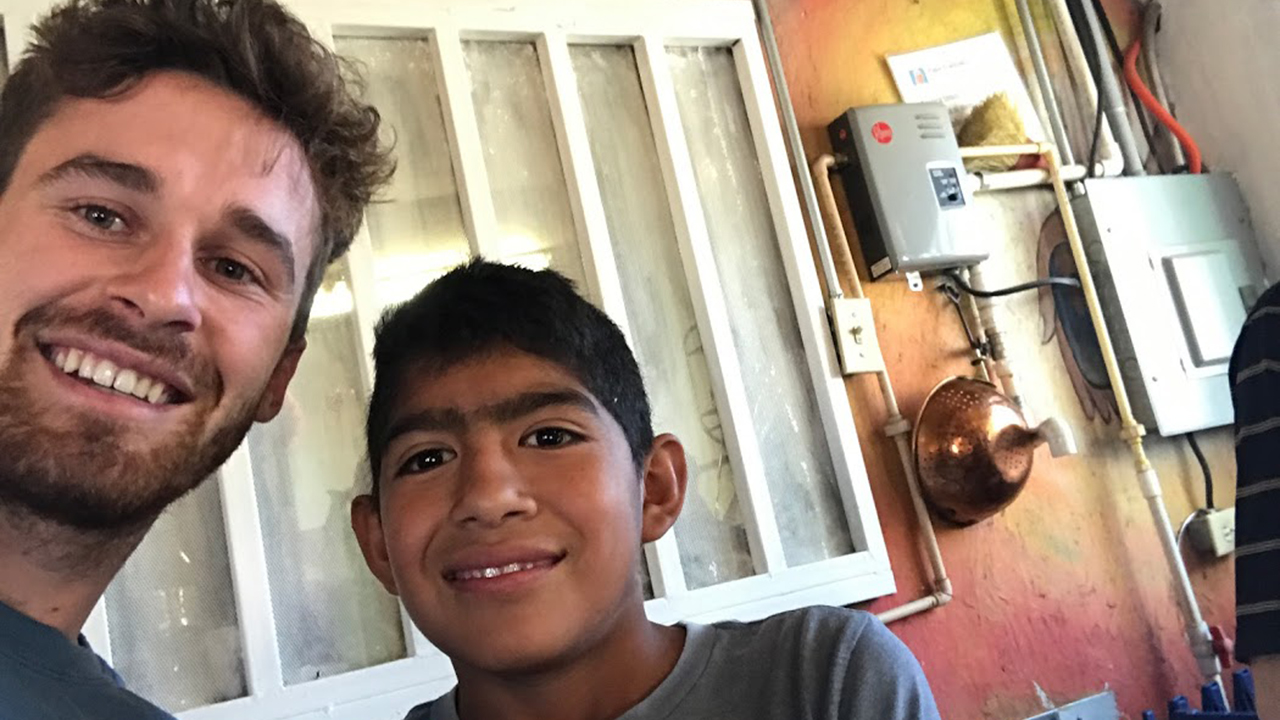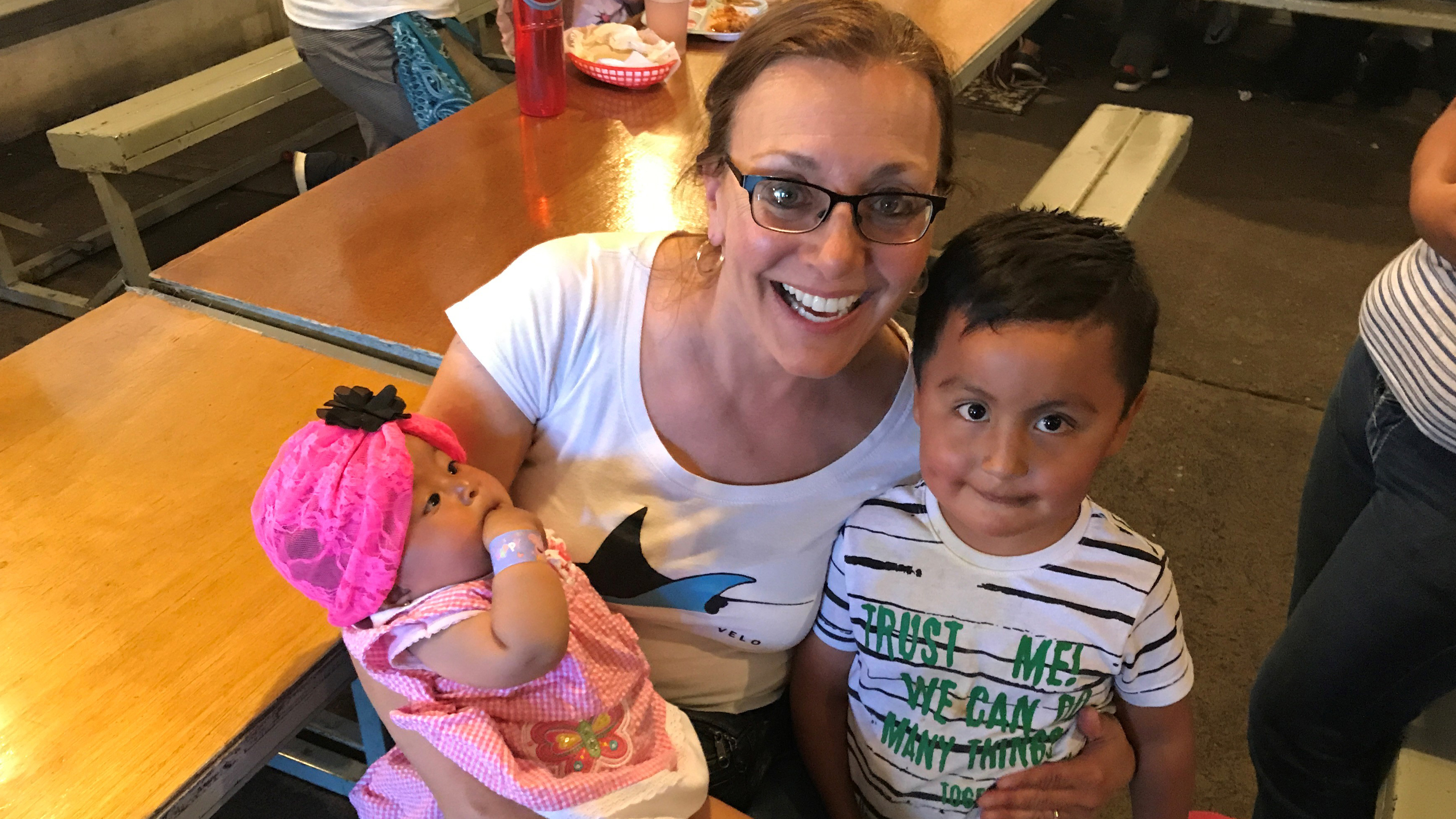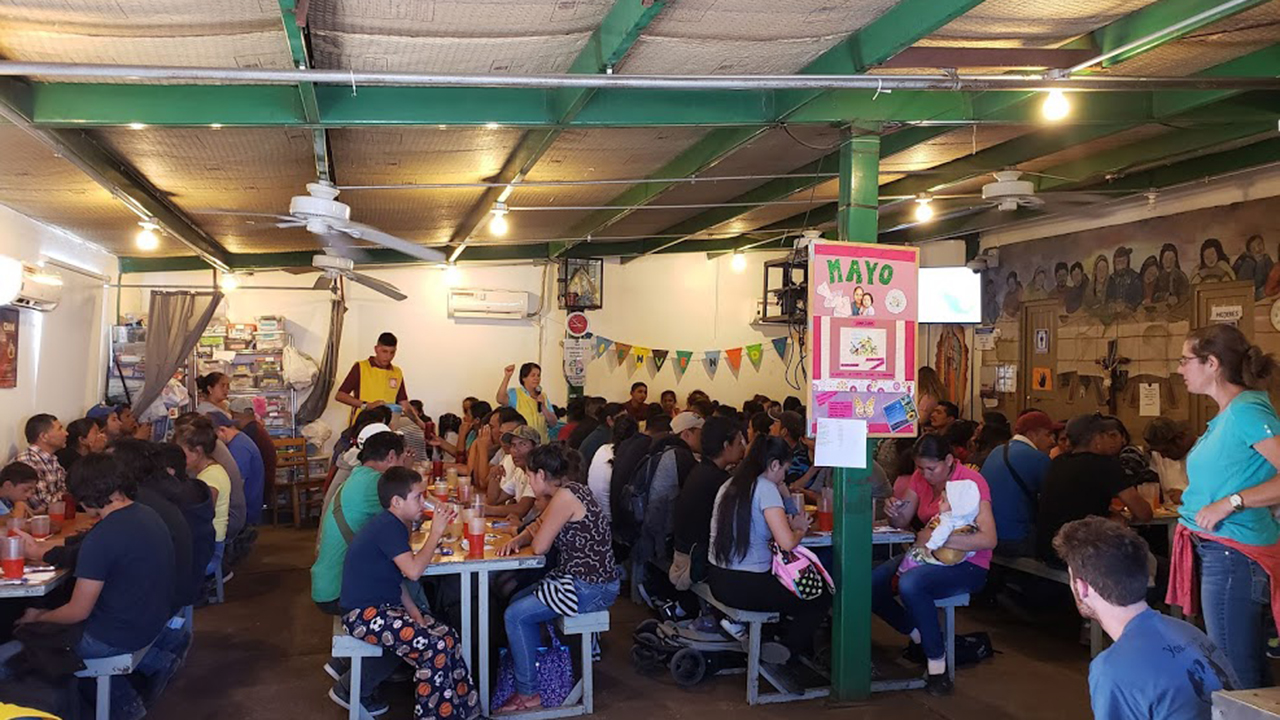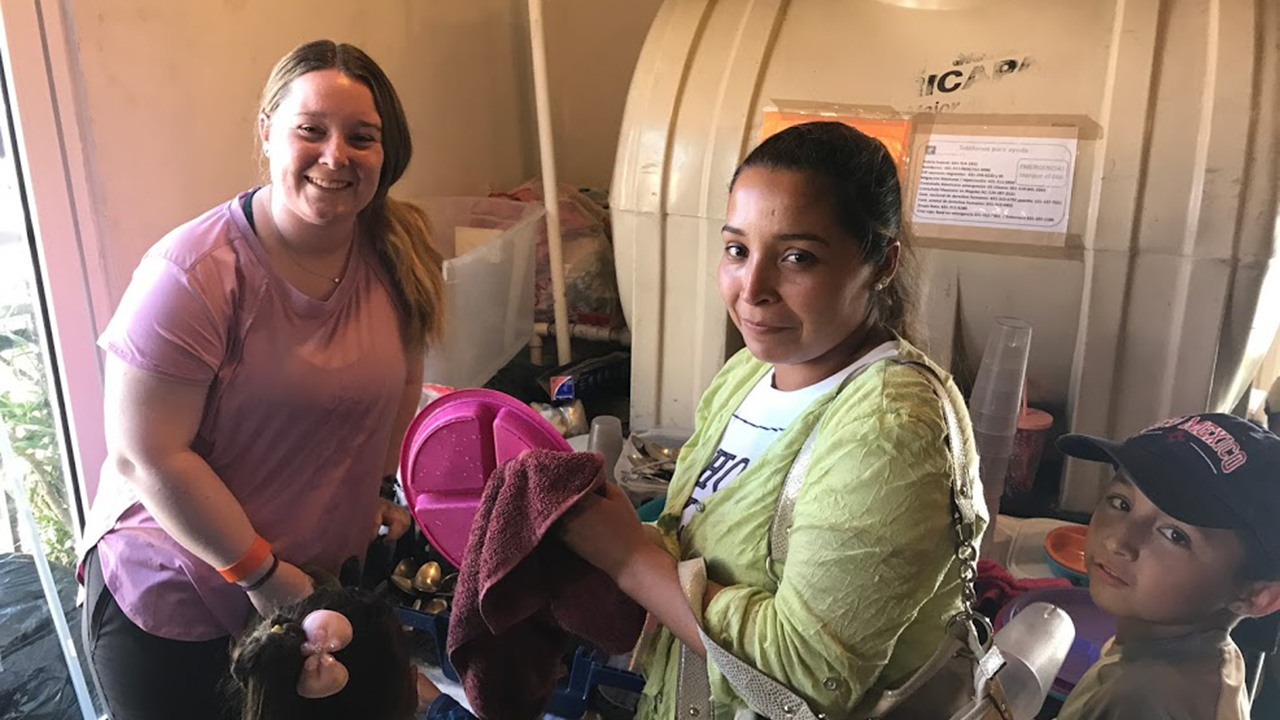Breaking Bread with Immigrants
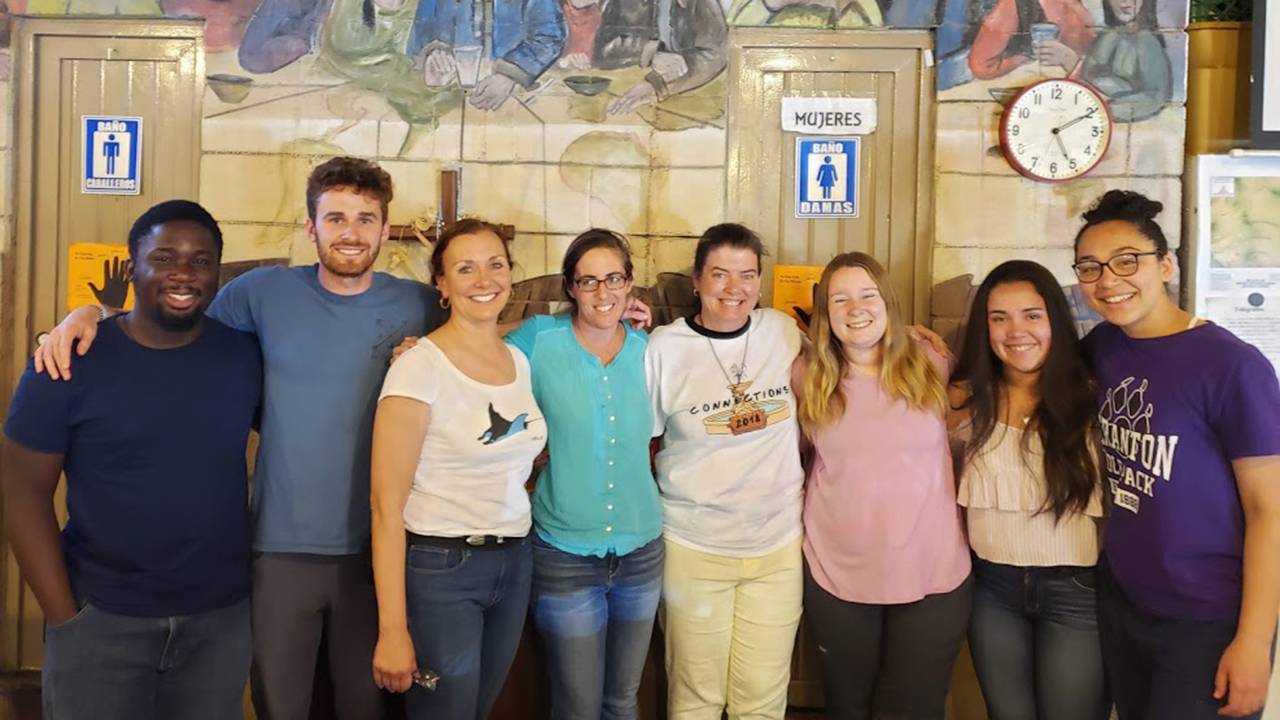
For several years, on my annual review, one of my long-term goals was to participate in a University-led service trip. However, as a full-time professor, wife, mother of three pre-teen and teenage children, along with a dog at home, I had reservations about the commitment such a trip would entail. Finally, in October 2018, I applied for and was selected to serve as a chaperone for the Kino Border Initiative, (KBI) trip. I began to learn about the required responsibilities that started with a “kick-off” retreat at Chapman Lake, the first weekend of the spring 2019 semester. This set into motion an increased knowledge of Catholic Social Teachings and a broadened awareness of the good works these service trips offer. The spring 2019 semester was filled with chaperone meetings, KBI group meetings, the great ball roll down the commons, along with an amazing Family Day that welcomed all of the chaperone and student family members who learned about the ten ISP trips offered through Campus Ministries and the journeys we would embark upon. The final gathering of students and chaperones was the commissioning Mass and Prayer Service, dedicated to our safety and good works. The spring semester was a time committed to growing closer to those with whom we would share the ISP experience and was instrumental in learning and preparing us for our unique trips.
KBI is a part of the Society of Jesus with a Jesuit house located in Nogales, Arizona, along with a comedor (communal dining hall) located in Nogales, Sonora, Mexico. Our daily interactions were with Fr. Pete Neeley, S.J., Joanna Williams and Katie Sharar, all of whom have distinct roles in the daily operations of KBI. In short, the primary role of KBI is to provide humanitarian support to migrants that include two hot meals daily; breakfast and dinner, along with basic medical supplies, clothing, legal counsel and asylum support. A separate women and children’s shelter provides safe housing for those in need without a spouse or partner.
Our experience was filled with daily walks across the border from the Jesuit house in Nogales, Arizona, to the comedor, located right on the other side of the border. As we arrived each morning, migrants: women, children and men, were lined along the fence, on the sidewalk, in the hot sun, patiently waiting for the comedor doors to open. As we entered the comedor, we were greeted by a hard-working and compassionate staff who included: Fr. Sam Lozano, S.J. and Srs. Engracia, Cecilia and Alicia, along with many others who worked tirelessly in preparing the meals for the migrants. Before each meal, a communal prayer was said, and it was moving to watch the migrants bow their heads in prayer, often with tears streaming down their faces, and pray in thanksgiving for their blessings. As Father Pete said, “You are witnessing the Gospel in action right here, as we are feeding the hungry and clothing the poor.” Our experience at the comedor consisted of helping the staff prepare the meals, setting the tables with about110 place settings for one meal, with two rounds of migrants served at each meal, for a total of about 420 meals served daily. We welcomed the migrants into the dining hall, served them food, drinks and dessert and together we washed the dishes and cleaned the hall for the next meal. At times, it was exhausting but our sense of satisfaction was great for having had this awesome opportunity.
Other experiences included a simulated desert walk through the high Arizona desert. This trek is taken by hundreds of migrants each year who desperately try to cross from Mexico to Arizona. Migrants pay cash to “coyotes”, who are part of the Mexican cartel, with the intent that they will be escorted safely through the desert. This was a profound experience as we witnessed many personal items dropped by the migrants, which included: backpacks, water bottles, clothing, children’s toys and stuffed animals and even women’s undergarments hung on trees, as many are assaulted on this trek, with the undergarments displayed as coyote’s trophies. Needless to say, this was an intense experience.
In order to gain an understanding of the complexity of the immigration issue, we learned about the different views and perspectives. For example, we spent an afternoon with a rancher and his wife who have more than 50,000 acres of land at the border and they shared their experience of migrants crossing the border onto their property with essentially no barrier, simply a flimsy, wire-fence, one could easily crawl underneath. Migrants have died on their land and cowboys who graze their land have been shot by the Mexican cartel who keep watch high in the mountains. This couple, who is in their eighties, fears for their safety in their home each night as they have loaded shotguns positioned at each door for protection. They are in favor of legal immigration and are strong proponents of a border wall.
We then spent a morning with the U.S. Border Patrol and learned about the challenges that face these men and women each day. The border agent who gave us the tour is a Mexican-American that moved to America illegally with his family as a young child. He became a legal citizen during his senior year in high school and is now married with children. He has a unique perspective, having been an illegal immigrant as a child. Although he is sympathetic to the migrants, his position as a border patrol agent for the past twelve years is to enforce the law in a humane and compassionate way.
We also spent an afternoon visiting the women and children’s center, located in a quiet residential neighborhood, several miles from the comedor. The shelter is a home tucked away from the street and tightly secured. We spent time there with ~ 6 young women and ~ 10 children. The women worked together in the meal preparation and watching the children play was heartwarming. A few of the women shared their experiences, one of whom with her infant daughter, walked with “the caravan” in March, as she felt safe due to a large number of migrants walking together. Another mother, cried and spoke of her heartache, as she remembered her 5-year old son she left behind in Guatemala with her mother. All of these women have the same hope of asylum with the KBI staff, their sole support and voice of freedom.
Another afternoon was spent in the Tucson federal courthouse and we watched court proceedings of dozens of migrants who were captured at the Nogales border and brought sixty miles north to Tucson to be deported back to Mexico. It was a chilling experience as all of the migrants, mostly young men and fewer women, had their hands and feet chained and shackled. As they walked into the courtroom in a single-file manner, the sound of the shackles and chains was heard throughout the courthouse chamber as they walked to their seats and then stood and listened with earphones for language translation, with an attorney at their side, while the judge read them their crime of illegal entry to which they all agreed was committed. Some were repeat offenders who were immediately sent to jail for 30-120 days, while others were immediately deported back across the border. Again, this experience was at times overwhelming as we watched so many young persons who had dreams of a better life shattered due to their illegal entry.
Overall, this experience was filled with dichotomous views and increased our awareness of the complexity of immigration, a polarized political issue. As a group, we were most impacted with our work in the comedor, spending time breaking bread with the migrants we met: infants, children, mothers, fathers, sons, daughters, all of whom are hoping for a better life. One of the sweetest experiences was an afternoon spent at the park across from the comedor where a soccer match was had between The University of Scranton students and any migrant families who chose to attend. It was awesome, language barriers were broken down and the sport took over that resulted in great joy for all who participated both in the game itself, as well as those cheering along on the sidelines. In the end, our human connection was profound, and our hope is that we will not lose sight of our humanity and fight for justice as St. Ignatius teaches us, in particular when policies are written with the intent to make all of our lives better.
To learn more about Immigration, the Kino Border Initiative and how you can make a difference, attend the Immigration Simulation on Thursday, March 5, in the McIlhenney Ballroom from 5 p.m-8 p.m. Faculty, staff and students are encouraged to participate for a minimum of 20 minutes. Volunteers are needed and should contact catherine.seymour@scranton.edu.




